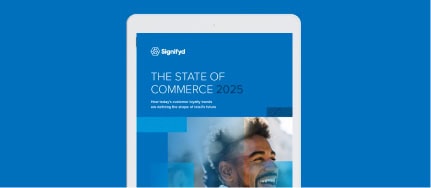Online retailer Dr. Dabber is so good at curtailing chargebacks that their payment processor reduced their rate by $3,000 a month. “He dropped our rates more than 1% – out of nowhere,” says Pantelis Ataliotis, president and co-founder of the Las Vegas-based vaporizer pen and vape accessories sales site. “Signifyd had a lot to do with that.” The news was especially sweet because it came only four months into Dr. Dabber’s relationship with a new payment processor. This, after its previous processor that the company had been with for three years dropped them without a warning, Ataliotis says.
A misunderstood industry
The trouble started two weeks before Black Friday, 2016 when Dr. Dabber, which sells instruments that heat liquid nicotine solutions but not the solutions themselves, got caught up in a purge. In a blanket application of new FDA rules regarding e-cigarettes, its processor stopped accepting credit card orders for Dr. Dabber’s products, Ataliotis says.
“We were desperately trying to find another payment processor and everybody I spoke to, the first thing they said to me was ‘What do your chargebacks look like?’ And I told them, ‘My chargebacks are low.’ I didn’t actually know at the time how low they were. But once I gave them all the numbers they said ‘Wow, yeah, your chargebacks are really low, we’d be happy to take you.’ So, that was Signifyd at the end of the day. If it wasn’t for the fact that our chargebacks were so low I’d say that we would have had a much, much harder time finding a payment processor.”
Signifyd keeps Dr. Dabber’s chargebacks low by leveraging real-time machine learning that incorporates external 3rd party data and compares each buyer’s credentials to transactions across a database of thousands of merchants globally. Signifyd then evaluates, approves and financially guarantees each legitimate order against fraud and chargebacks.
“After a couple months, after we were dealing with the payment processor issue, everything had kind of settled down and the only way that (the new FDA rules) affected us is we had to put a ’21 and over’ label on our packaging,” says Ataliotis. “Lack of understanding of the actual rules caused the whole mess.”
Challenging chargebacks
Prior to signing up with Signifyd, the company challenged chargebacks “the old fashioned way,” Ataliotis says. “We basically filled out little forms and sent them off to our credit card company.” Positive replies came no more than once every twenty attempts, he says. “Occasionally we’d get a response that our chargeback was approved. It was an exciting moment – we were so used to sending them off into the abyss that if one ever came back with an actual chargeback win in our favor it was a bonus. It was a joke, honestly.”
Ataliotis was operations manager for the general franchise of an Italian coffee brand in his native Cyprus in October of 2013 when he and his partner, Jamie Rosen, a professional poker player, started Dr. Dabber. The vaping craze was just catching fire. The company at first consisted of only the two of them.
“I was actually the one dealing with every single customer service detail and all of that stuff,” Ataliotis says. “And the fraud was outrageous. I mean it was ridiculous. There were so many times when we were getting emails that I knew full well were fraudulent but pretended they weren’t.”
Manual order review
To root out fraud Ataliotis says he used common sense, intuition and “the tools you have to find out what you can about a stranger. It becomes pretty easy to spot when they’re not telling the truth or telling me something that isn’t the actual case.”
When the company expanded to three people the job of one of the principals was to check for fraudsters.
“We were dealing with so many other things. (Fighting fraud) was by no stretch of the imagination my favorite thing to do. I mean it was a huge inconvenience, a huge hassle. It’s kind of personally frustrating, too. You know that someone is trying to get one up on you and you have one channel to redeem yourself or dispute it. And (from) that channel (filing against a chargeback), you basically don’t get a response the majority of the time. So, it’s really frustrating on a personal level, too,” says the company president.
Ataliotis says he spent the better part of an hour out of every day weeding out phony orders. “When you think about the fact that I was responsible for 70% of the operation, that was a significant amount of time.”
“It was frustrating for me to have some Joe Shmoe pull one over on us. Generally speaking I’m a problem solver so if someone wrongs me I can figure out a way to solve the problem whether it be with that person or find someone else or whatever it may be,” he says. “There was very little that I could do in terms of making it right.”
A better platform
The company’s platform, at the time, was developed by a contractor based on an open source ecommerce platform written in PHP. “It felt like you were logging on to 1990. We had a really hard time finding anything that was compatible with whatever bills we had at the time. We didn’t have an any in-house IT resouces.”
Ataliotis says he tried certain fraud filters but they didn’t work. When the company later switched to a Shopify platform “then all of a sudden we had easy access” to lots of other add-ons and extensions including Signifyd. “Very simple to set up, anybody could do it and there’s no need for an IT guy or anything like that as long as you made payments it does the job.”
Before Signifyd, Dr. Dabber struggled with online thieves who tried to order one item at a time, though some would attempt to order six $200 vaping pens at once, Ataliotis says.
Brazen burglary
Then there was the full frontal assault. “We had this month, around November of 2015 – we were relentlessly attacked by these fraudsters all day, every day,” says Ataliotis. “All the orders were going to Champaign, Illinois of all places and it was just $800 orders and $1500 orders, $3,000 orders. And, you know, our average order on the site is like ninety to a hundred bucks, so these were huge, huge orders and so they just didn’t make sense. And they kept going to the same city but they were all different addresses, driving us absolutely insane. So all of a sudden I’m having to look at every different sale on the website and verify them one by one. The fraud filters I had at my disposal at the time weren’t set up to deal with these guys. They kept passing through over and over again. I kept updating the settings. I spoke to customer support to tell them what was happening. They helped me tweak and update the settings to whatever I was supposed to tweak them to. But even then, fraudulent orders were still passing through. It was a mess.”
“Those guys probably could have gotten away with $20,000, $30,000 worth of product if it wasn’t for the fact that we were diligently– every single day, once an hour — checking the orders before they were sent out making sure it wasn’t one of these fraudulent orders.”
Another coordinated fraud effort was mounted by “some college students relentlessly over a year attacking the site multiple times a day trying to get free stuff.” The names were always male; the addresses, always dorm rooms. “We just dealt with it internally and moved on with our lives,” says Ataliotis, who says he never called the police or the FBI. “How draining it was…it was a time suck, it was the bane of my life, it was something that I constantly had to deal with.”
Focusing on growth
But now with Signifyd on the job, Ataliotis says only one member of his customer service team spends about 10 minutes a day on fraud. “All we have to do is file for that guarantee and then we get our money back,” says Ataliotis. “I love Signifyd. You guys saved me a lot of money on a regular basis. If Signifyd disappeared tomorrow or for whatever reason we have to move from Shopify there’d definitely be a void that had to be filled. I rely on Signifyd pretty heavily.”
Dr. Dabber grew from three people to 22 in a matter of six months and now onlines sales account for 60% of its total revenue. The other 40% comes from wholesale sales. “We have a distribution agreement with one of the largest vaporizer distributors in the country, so we’re in 3,000 to 3,500 brick and mortar stores as well as our own site and dozens and dozens of online retail vaporizer sites,” says Ataliotis. The company’s target demographic is 70% male. Most buyers are 18 to 35, or, in states where the legal age is higher 21-35. But some customers can be as old as 80, Ataliotis says.
“Our growth has been phenomenal over the last three years and we’re still putting up record months on a regular basis,” says Ataliotis crediting Signifyd, in part. “It’s really an invaluable tool. You can’t really put a price on the value of peace of mind. I can only imagine how many people are out there banging their heads against the wall as I was that haven’t considered a fraud filter. Maybe they are on a different platform that doesn’t provide something like Signifyd. The time and effort alone makes it worth it’s weight in gold. Any money we save is a bonus. I’m happy to pay what Signifyd is asking for their services.”
He says his customer service manager loves Signifyd too. “He finds it very easy to use. It’s not tedious, and we get responses. We’re actually interacting in a way that I wish we were able to interact with our payment processor when we were originally trying to file chargeback responses.” This means Ataliotis can now direct his attention to product development. “That’s really my passion. This is what I’ve wanted to do from day one.”







